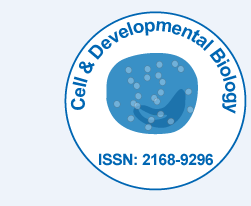
Cell & Developmental Biology
Open Access
ISSN: 2168-9296

ISSN: 2168-9296
Perspective - (2022)Volume 11, Issue 2
DNA methylation is an enzyme-mediated chemical modification of DNA in which a methyl group is added symmetrically to the CpG dinucleotide cytosine. This reaction is catalyzed by a group of enzymes called DNA Methyltransferases (DNMTs). In humans and other mammals, DNA methylation usually occurs in cytosine, which precedes guanosine in the DNA sequence. DNA methylation is important for controlling stem cell proliferation and differentiation.
Pluripotent stem cells from many adult tissues are attractive stem cell resources for replacing damaged tissue in regenerative medicine, such as bone marrow, peripheral blood, fat, skeletal muscle, brain, skin, cornea, and heart. It has been identified in many organs and tissues, intestinal, liver, ovarian epithelium and testicles. All pluripotent stem cells are defined as undifferentiated cells, are capable of self-renewal at high proliferation rates, and have the potential to differentiate into specialized cells with specific functions. Unlike pluripotent Embryonic Stem (ES) cells, pluripotent stem cells are usually restricted to a particular lineage (mesoderm, endoderm, or ectoderm), but when properly stimulated, a different body, may differentiate into cell types. The two main advantages of their use in clinical applications are that they avoid some of the ethical issues associated with pluripotent Embryonic Stem (ES) cells, which leads to take more time to get approval for research and its applications in therapeutic use. The origin of adult stem cells and tissues is currently considered less important likely to cause rejection after transplantation. Embryonic Stem (ES) cell chromatin is in a highly dynamic state, with global DNA hypomethylation and generally abundant transcriptionally active chromatin markers such as H3K4me3 and histone H4 acetylation, compared to Embryonic Stem (ES) cells. It is reflected in the decondensed chromatin. DNA methylation and histone modification do not work alone, and epigenetic inactivation of differentiation-specific genes (i.e., the Hox and Pax gene families) in stem cells is usually suppressed by alternative chromatin remodeling factors such as polycomb proteins.
Human adult stem cells are a promising tool for applying new clinical concepts to support cell therapy, but many aspects to ensure proper quality assurance and control of these cells, such as avoiding inappropriate gene expression in transplanted cells or the undesirable traits of tumorigenesis. The potential for gene expression in stem cell regeneration and differentiation may be regulated by epigenetic processes that provide specific chromatin conformations in the genome where DNA methylation is best characterized.
DNA methylation is the addition of a methyl group to C-5 position of cytosine in the context of CpG and is known to be an essential process for development and cell differentiation. It is involved in housekeeping and gene regulation of histological genes, silencing of alleles of imprinted genes, and compensation for extra copies of the female X chromosome. It acts as a defense mechanism and prevents genomic instability due to transpose movement and insertion of endoparasite sequences into the genome. It is important to note that DNA methylation does not function alone to regulate chromatin conformation, as histone modification and non-coding RNA regulation also contribute to its regulation. The relationship between promoter DNA methylation and promoter activity depends on the CpG content of the promoters: High CpG Promoters (HCPs), intermediate CpG promoters, or Low CpG Promoters (LCPs). In Embryonic Stem (ES) cells and multipotent progenitor cells, HCP promoters are characterized by low DNA methylation levels, whereas LCP promoters are enriched in DNA methylation.
Citation: Volkan W (2022) Importance of DNA Methylation in Stem Cells. Cell Dev Biol. 11:246.
Received: 03-May-2022, Manuscript No. CDB-22-17903; Editor assigned: 06-May-2022, Pre QC No. CDB-22-17903 (PQ); Reviewed: 20-May-2022, QC No. CDB-22-17903; Revised: 27-May-2022, Manuscript No. CDB-22-17903 (R); Published: 03-Jun-2022 , DOI: 10.35248/2168-9296.22.11.246
Copyright: © 2022 Volkan W. This is an open-access article distributed under the terms of the Creative Commons Attribution License, which permits unrestricted use, distribution and reproduction in any medium, provided the original author and source are credited.